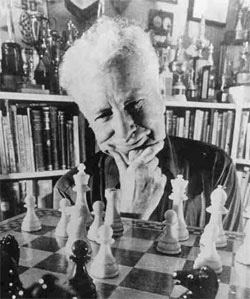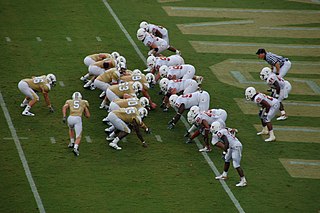Related Research Articles

The Elo rating system is a method for calculating the relative skill levels of players in zero-sum games such as chess. It is named after its creator Arpad Elo, a Hungarian-American physics professor.

The Bowl Championship Series (BCS) was a selection system that created four or five bowl game match-ups involving eight or ten of the top ranked teams in the NCAA Division I Football Bowl Subdivision (FBS) of American college football, including an opportunity for the top two teams to compete in the BCS National Championship Game. The system was in place for the 1998 through 2013 seasons and in 2014 was replaced by the College Football Playoff.
The rating percentage index, commonly known as the RPI, is a quantity used to rank sports teams based upon a team's wins and losses and its strength of schedule. It is one of the sports rating systems by which NCAA basketball, baseball, softball, hockey, soccer, lacrosse, and volleyball teams are ranked. This system was in use from 1981 through 2018 to aid in the selecting and seeding of teams appearing in the NCAA Division I men's basketball tournament as well as in the women's tournament from its inception in 1982 through 2020.

A sports rating system is a system that analyzes the results of sports competitions to provide ratings for each team or player. Common systems include polls of expert voters, crowdsourcing non-expert voters, betting markets, and computer systems. Ratings, or power ratings, are numerical representations of competitive strength, often directly comparable so that the game outcome between any two teams can be predicted. Rankings, or power rankings, can be directly provided, or can be derived by sorting each team's ratings and assigning an ordinal rank to each team, so that the highest rated team earns the #1 rank. Rating systems provide an alternative to traditional sports standings which are based on win–loss–tie ratios.

The BCS National Championship Game, or BCS National Championship, was a postseason college football bowl game, used to determine a national champion of the NCAA Division I Football Bowl Subdivision (FBS), first played in the 1998 college football season as one of four designated bowl games, and beginning in the 2006 season as a standalone event rotated among the host sites of the aforementioned bowls.
The Associated Press poll provides weekly rankings of the top 25 NCAA teams in one of three Division I college sports: football, men's basketball and women's basketball. The rankings are compiled by polling 62 sportswriters and broadcasters from across the nation. Each voter provides their own ranking of the top 25 teams, and the individual rankings are then combined to produce the national ranking by giving a team 25 points for a first place vote, 24 for a second place vote, and so on down to 1 point for a twenty-fifth place vote. Ballots of the voting members in the AP poll are publicized.
The selection process for college basketball's NCAA Division I Men's and Women's Basketball Tournaments determine which teams will enter the tournaments and their seedings and matchups in the knockout bracket. Currently, thirty-two (32) teams gain automatic entry through winning their conference's championship. The remaining teams rely on the selection committee to award them an at-large bid in the tournament. The selection process primarily takes place on Selection Sunday and the days leading up to it. Selection Sunday is also when the men's brackets and seeds are released to the public. Beginning in 2022, the women's championship brackets and seeds are also announced on Sunday. Prior to the expansion of the bracket from 64 to 68 teams the women's championship brackets and seeds were announced one day later, on Selection Monday.

The First Four is a play-in round of the NCAA Division I men's and women's basketball tournaments. It consists of two games contested between the four lowest-ranked teams in the field, and two games contested between the four lowest-seeded "at-large" teams in the field, which determine the last four teams to qualify for the 64-team bracket that plays the first round.

Kenneth Massey is an American sports statistician known for his development of a methodology for ranking and rating sports teams in a variety of sports. His ratings have been a part of the Bowl Championship Series since the 1999 season. He is an assistant professor of mathematics at Carson–Newman University in Tennessee.
In American college football, the 2006 BCS computer rankings are a part of the Bowl Championship Series (BCS) formula that determines who plays in the BCS National Championship Game as well as several other bowl games. Each computer system was developed using different methods which attempts to rank the teams' performance. For 2006, the highest and lowest rankings for a team are dropped and the remaining four rankings are summed. A team ranked #1 by a computer system is given 25 points, #2 is given 24 points and so forth. The summed values are then divided by 100. The values are then ranked by percentage. This percentage ranking is then averaged with the Coaches Poll and Harris Poll average rankings, each receiving equal weight, and the results become the BCS Rankings.

The 2001 Auburn Tigers football team represented Auburn University in the 2001 NCAA Division I-A football season. They posted a 7–5 record, including a record of 5–3 in the Southeastern Conference. The Tigers finished the season tied for first place in the SEC West Division, but did not qualify for the SEC Championship Game because of tie-breakers.
In American college football, the 2007 BCS computer rankings are a part of the Bowl Championship Series (BCS) formula that determines who plays in the BCS National Championship Game as well as several other bowl games. Each computer system was developed using different methods which attempts to rank the teams' performance. For 2007, the highest and lowest rankings for a team are dropped and the remaining four rankings are summed. A team ranked #1 by a computer system is given 25 points, #2 is given 24 points and so forth. The summed values are then divided by 100. The values are then ranked by percentage. This percentage ranking is then averaged with the Coaches Poll and Harris Poll average rankings, each receiving equal weight, and the results become the BCS Rankings.

A national championship in the highest level of college football in the United States, currently the NCAA Division I Football Bowl Subdivision (FBS), is a designation awarded annually by various organizations to their selection of the best college football team. Division I FBS football is the only National Collegiate Athletic Association (NCAA) sport for which the NCAA does not host a yearly championship event. As such, it is sometimes referred to as a "mythical national championship".

The 2009 Auburn Tigers football team represented Auburn University during the 2009 NCAA Division I FBS football season. The Tigers were led by first year head coach Gene Chizik. Despite playing the 12th toughest schedule in the nation, the Tigers finished the season 8–5 and won the Outback Bowl 38–35 in overtime against Northwestern.
A chess rating system is a system used in chess to estimate the strength of a player, based on their performance versus other players. They are used by organizations such as FIDE, the US Chess Federation, International Correspondence Chess Federation, and the English Chess Federation. Most of the systems are used to recalculate ratings after a tournament or match but some are used to recalculate ratings after individual games. Popular online chess sites such as chess.com, Lichess, and Internet Chess Club also implement rating systems. In almost all systems, a higher number indicates a stronger player. In general, players' ratings go up if they perform better than expected and down if they perform worse than expected. The magnitude of the change depends on the rating of their opponents. The Elo rating system is currently the most widely used. The Elo-like ratings systems have been adopted in many other contexts, such as other games like Go, in online competitive gaming, and in dating apps.
David Rothman was an American statistician, public policy advisor, and the creator of a computerized college football ranking system.

The College Football Playoff (CFP) is an annual postseason knockout invitational tournament to determine a national champion for the National Collegiate Athletic Association (NCAA) Division I Football Bowl Subdivision (FBS), the highest level of college football competition in the United States. It culminates in the College Football Playoff National Championship game. The inaugural tournament was held at the end of the 2014 NCAA Division I FBS football season under a four-team format. The CFP expands to include twelve teams for the 2024 season.
The Billingsley Report is a college football rating system developed in the late 1960s to determine a national champion. Billingsley has actively rated college football teams on a current basis since 1970. Beginning in 1999, Billingsley's ratings were included as one of seven mathematical formulas included in the Bowl Championship Series (BCS) rankings.
The FIBA Women's World Ranking is the FIBA's rankings of national women's basketball teams. FIBA ranks women's national teams in both senior and junior competitions. It also publishes combined rankings for all competitions involving both sexes.
The Colley Matrix is a computer-generated sports rating system designed by Dr. Wesley Colley. It is one of more than 40 polls, rankings, and formulas recognized by the NCAA in its list of national champion selectors in college football.
References
- ↑ Glockner, Andy (26 August 2013). "Verbatim: Stats guru Jeff Sagarin (Part 1)". Sports Illustrated . Retrieved 9 February 2024.
- 1 2 3 4 Bagnato, Andrew (November 11, 1998). Written at Bloomington, Indiana. "Poll-setter: One of the most powerful men in college football is a mysterious computer whiz in Indiana". Chicago Tribune . Chicago, Illinois. pp. 1, 4 . Retrieved May 6, 2024.
His rankings, published weekly in USA Today, are part of the complicated formula that will be used to determine the pairing in the Fiesta Bowl. Sagarin also has been a consultant for BCS boss Roy Kramer, who's something of a math whiz himself.
- ↑ USA Today Jeff Sagarin's page
- ↑ West, Brady T. (2008) "A Simple and Flexible Rating Method for Predicting Success in the NCAA basketball tournament: Updated Results from 2007," Archived 2011-07-07 at the Wayback Machine Journal of Quantitative Analysis in Sports: Vol. 4 : Iss. 2, Article 8. doi : 10.2202/1559-0410.1099 (Sec. 2.2)
- ↑ Official BCS Website: Standings
- ↑ Jonietz, Erika (November 1, 2002). "Computing Athletics". MIT Technology Review . Massachusetts Institute of Technology . Retrieved 9 February 2024.
- ↑ Burns, Ed (30 March 1987). "WARNING: 'HOOPS' MAY BE ADDICTIVE". Sports Illustrated. Retrieved 14 November 2020.
- ↑ "Jeff Sagarin Sports Ratings - USA TODAY Sports". USA Today .
- ↑ Leonhardt, David (2003, April 27). Mavericks' New Math May Be an Added Edge. NY Times
- ↑ (2004, April 13). Numbers game. The Washington Times